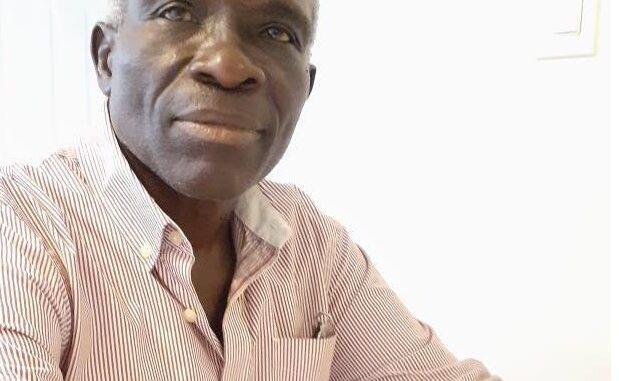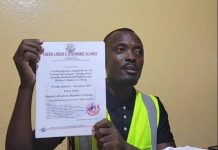Africa-Press – Liberia. Once again, money exchangers are giving L$154 for the US$1.00, even though, less than 60 days ago, they gave L$170. In August, using the US $5, customers could buy one gallon of gasoline at L$640 and get back L$210 in change. Now, a customer will get L$60 in change because the exchange rate, for the US $5, has dropped from L$850 to L$700.
About one year ago, on November 11, 2020, Mr. Obediah Johnson, reporting for a local newspaper, stated that “…the abrupt sharp decline in the exchange rate between the Liberian and United States dollars is said to be worsening economic constraints and imposing additional hardship on the vast majority of Liberians, most of whom are impoverished.”
Mr. Sam P. Jackson, an MSc candidate at the London School of Economics, and supporter of the Ruling Party, Congress for Democratic Change, during an interview with Liberia News Agency (LINA Panorama), held on October 18, 2021, praised the Government of the Republic of Liberia for its economic policies.
He stated that the appreciation of the Liberian currency would allow money exchangers to get more US currency, and Liberian exporters will get more US dollars than they got yesterday for the same goods and services adding, it is true that a few business owners are capitalizing on the exchange rate to make huge profits; but that is what capitalists do.
How do policymakers manage the economy such as the exchange rate?
They consider the following:
1) Changes in government spending or taxation;
(2) Changes in the money supply; and
(3) Attempts to increase production to address economic issues such as the exchange rate, according to (www.Investopedia.com.)
In a simple explanation, what factors increase the value of the Liberian dollar? They are:
(1) the increase in the US currency by selling more exported goods,
(2) the increase in the US currency by borrowing more US dollars,
(3) the increase in the US currency by seeking donations from those who can give US dollars, etc.
Alternatively, the following can be done: (1) government can reduce the printing of new banknotes,
(2) government can withhold some quantity of the Liberian currency from the market, thereby, reducing the Liberian currency on the market. Mr. Sam Jackson didn’t discuss any factors influencing the exchange rate.
Although Mr. Jackson didn’t comment, the Liberian People’s Party addressed the wrong fiscal policy (cut in spending) and ill-advised monetary policy (high-interest rate) of President George Weah’s administration within two separate press releases. In its August 24, 2021, publication, the LPP stated that while it “accepts the theory and practice that government can cut spending, however, the huge cut of USD $33M as reported within the 2021 National Budget will affect government operations and reduce cash in-take for businesses such as newspapers, office equipment, and supplies stores, gasoline stations, restaurants, local farmers, etc.
Later, on August 30, 2021, the Party called “…on Liberian Lawmakers and stakeholders to encourage President George Weah to end the practice of offering attractive interest rates (20%) to commercial banks (CB). Commercial banks, seeking higher returns on their investment, would reduce lending money at a 12% interest rate to businesses since they can earn more interest income by buying the government’s promissory notes offering a 20% interest rate.
Page # 47 of the Central Bank of Liberia 2020 Annual Report stated that “… the total unredeemed T-Bills and T-Bonds for the review period stood at L$7.53 billion and US$65.93 million… in various tenors (2-weeks, 1-month, 3-months, 6-months, and 12-months).”
Why did our country introduce the use of two currencies in Liberia in the first place? The International Monetary Fund stated that it was due to the shortage of cash to finance programs and the need to reserve cash for an emergency, including the practice to keep reserves to be used in maintaining and supporting monetary policy.
The “…oil crises and global recession of the 1970s and 1980s had eroded cash surpluses, therefore, the government introduced the local currency alongside the U.S. dollar, according to the International Monetary Fund.
In short, add the Liberian dollar when a government is broke or when the local currency appreciates in value. Well, our Liberian government withheld Liberian currency away from the market, thereby, reducing the quantity.
Our economic advisers reduced spending when it cut the budget. Also, it reduced Liberian currency on the market when it offered a 20% interest rate for government promissory notes.
Interestingly, why did the government take away additional cash from the market in exchange for promissory notes offered to commercial banks when it reduced the money it usually pumps into the market by cutting spending?
Moreover, the LPP holds the view that money borrowed from the commercial banks would not have reduced the quantity of money on the market if the economic team had included proceeds from the sales of the promissory notes as cash in-take-in and increased government spending. (See page # XXIV of 2021 Budget).
Assuming for the sake of the argument that Mr. Jackson might not believe that the cut in spending and the reduction of cash from the banks did not reduce the Liberian exchange rate however, the economic records of Liberia do not show that Liberia received additional US currency which is the other factor that reduces the Liberian exchange rate.
Additionally, records show that Liberian currency was valued at L$19B on March 31, 2021 (L$41B minus L$22B currency outside of the banking system).
The Central Bank of Liberia 2020 Annual Report, signed on March 31, 2021, has information on the total “Broad Money” and the total Liberian currency.
On pages # 39 and # 40, the Report shows that “Total Broad Money” was L$127B, Liberian currency was L$41B, and that L$22B was outside of the banking system.
So, the Central Bank of Liberia (CBL) records show that L$19B was within the banking system, but, signs suggest that , our economic advisers appear to be keeping the Liberian currency away from the public, hence, the shortage of the Liberian currency.
Let us review this assertion by visiting the numbers within the National Budget and sales of promissory notes to commercial banks. The budgetary experts cut spending and did not re-allocate the savings to finance other programs?
Additionally, where is the cash from the proceeds of the sales of government promissory notes?
Again, our analysis shows that national budgetary experts did not include the cash received from domestic creditors within the National Budget as cash in-take.
In order to mitigate the adverse impact on the economy and the economic hardships on the people induced by such policies, the LPP recommends the following:
(1) Restore the cut in spending;
(2) End the sales of promissory notes at 20% to commercial banks;
(3) Include within the National Budget proceeds of the sales of promissory notes.
LPP Secretariat
J.Yanqui Zaza
For More News And Analysis About Liberia Follow Africa-Press






